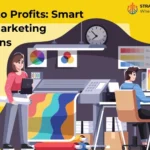In the ever-evolving landscape of digital marketing, Pay-Per-Click (PPC) advertising stands as a stalwart player in driving web traffic, enhancing brand visibility, and propelling business growth. Whether you’re a seasoned marketer or a novice stepping into the realm, understanding and effectively navigating the world of PPC can be a challenging feat. This blog post aims to guide you from the basics through to advanced PPC tactics to help master this crucial digital marketing strategy.
To start with the basics, PPC is a model of online advertising where advertisers pay a fee each time their ad is clicked, effectively buying visits to their site rather than earning them organically. The most popular platform for PPC is Google Ads, although Bing Ads, Facebook Ads, and others offer similar services. The strength of PPC lies in its ability to target specific keywords, demographics, and geographic locations, making it a versatile tool for businesses of all sizes.
The cornerstone of a successful PPC campaign lies in keyword research. It is essential to identify and bid on the keywords that potential customers are likely to use when searching for your products or services. Tools such as Google Keyword Planner can provide insights into the popularity of specific search terms and estimate traffic volumes.
But effective PPC goes beyond basic keyword research. As we delve into more advanced tactics, consider the concept of Quality Score. This is a metric used by search engines to determine the relevance and quality of your PPC ads and landing pages. A higher Quality Score can result in better ad positions and lower costs. Therefore, always aim to create relevant, high-quality ads and optimize your landing pages.
Furthermore, consider remarketing, an advanced PPC tactic that allows you to show ads to users who have previously visited your website. This strategy can be incredibly effective, as these users have already shown an interest in your brand or products. With tailored messaging and offers, you can encourage them to return and complete a purchase.
PPC is not just about direct response marketing; it’s also about brand awareness. Broad, non-specific keywords might not lead to immediate conversions, but they can help expose your brand to a wider audience. However, this approach requires careful budget management to ensure your PPC spending doesn’t skyrocket.
Lastly, it’s crucial to stay abreast of the latest PPC trends and features. Search engines and social media platforms continuously refine their PPC offerings. For instance, Google Ads has been increasingly incorporating machine learning capabilities into their platform to optimize campaigns. Staying updated will enable you to make the most of these features and gain a competitive edge.
In conclusion, navigating the complex world of PPC involves a balance between grasping the basics and leveraging advanced tactics. It requires ongoing learning, testing, and optimization. But with the right approach and perseverance, PPC can become a significant driver of business growth and brand visibility.





